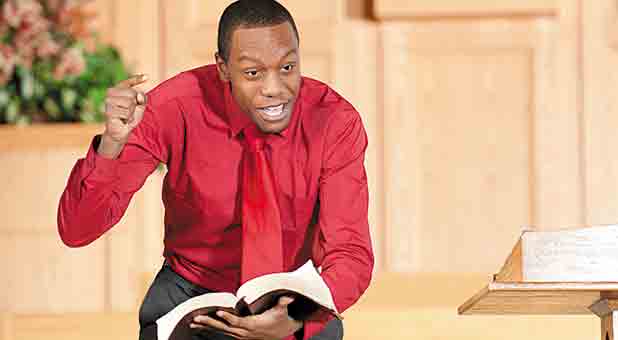
One of my biggest problems in sermon writing is what people call "analysis paralysis." I get so involved in studying for a sermon that, eventually, the more I study, the worse it becomes. So here are some suggestions I have found helpful in my preparation:
1. Do a two-minute warning. To cure this, I started implementing something I call my "two-minute warning." I stole it from my high school head football coach. Our high school football team went to the state championship—mostly due to our incredible coach and not so much because of the talent on the team.
Every Thursday at the very end of practice, the night before the big game, we would do what he would call the "two-minute drill." He would line us up on our own 10-yard line and then say, "Guys, you have two minutes to put the ball in the end zone."
As the quarterback, everything came rushing together—all the adrenaline, everything we had practiced, all the tips and ideas from our coaching staff—it all collided at that moment and forced me to quickly deduce what I needed to do to put the ball in the end zone.
I do a similar thing when I study for a message. I study for four hours, then grab a piece of paper and say, "OK, I'm walking to the pulpit in two minutes and I can't take anything with me but an outline. OK, Brian, you have two minutes to write down your message in outline form. Go!"
Then I force myself to cut through all the stuff, all the ideas and all the clutter and get down to the heart of what I should talk about. Nine times out of 10, that outline becomes the actual outline I use for the message. For the rest of the week, an additional four hours, I craft what I decided to preach on in that two-minute drill.
2. The greatest enemy to keeping our noses to the grindstone and writing great sermons is not necessarily a lack of discipline but our next best spiritual gift. Every pastor I know, especially me, acknowledges the reason we don't consistently preach great sermons is because we can't stay in our seats long enough to hear from God and think deeply. My homiletics professors told me this would be the case, and to combat this, we needed to develop high levels of discipline. I think they were wrong. My biggest problem isn't that I lack discipline; it's that God has gifted me with a few other spiritual gifts I like using on a regular basis too.
I have three spiritual gifts–leadership, teaching and evangelism. When I can't stay glued to the seat, it's usually because I'm drawn into leadership or evangelistic activities, not because I haven't watched that rerun of The Blacklist I DVRed last week. (All of this underscores why I think preaching should be taught by senior pastors who are actually preaching, who have to deal with all the demands of an actual church.)
Therefore, in my mind, one of the keys to trying to preach good stuff is purposely not to spend too much time writing sermons and to block out large amounts of time for my other gifts. I figured out that eight hours a week is just about all I can do before I start climbing the walls. That gives me a good 20 hours a week for leadership, a good 10 for evangelism stuff and another 15 or so for the miscellaneous stuff we all deal with.
3. Begin well, end well and tell two good stories in between. When I was a freshman in Bible college, a family friend and mentor took me out to dinner one night. During dinner, he asked me a question that shaped how I view my preaching task.
"Brian, do you know what all great preachers have in common?"
I looked at him with a blank stare.
"They can all tell a story. Learn how to tell stories, Brian, and you'll never have a problem keeping the Good News fresh and exciting."
Like you, through the years, I've read all the books I was told to read on how to preach a great sermon: "Try this technique. Try this outline. Do this unique thing."
Nothing has helped me more than John Samples' simple advice: Open with a great story. Close with a great story. Tell two great stories in between.
Brian Jones is the founding senior pastor of Christ's Church of the Valley in Philadelphia. A graduate of Princeton Theological Seminary, he is an author of several books and a blogger at brianjones.com.
Get Spirit-filled content delivered right to your inbox! Click here to subscribe to our newsletter.
Dr. Mark Rutland's
National Institute of Christian Leadership (NICL)
The NICL is one of the top leadership training programs in the U.S. taught by Dr. Mark Rutland. If you're the type of leader that likes to have total control over every aspect of your ministry and your future success, the NICL is right for you!
FREE NICL MINI-COURSE - Enroll for 3-hours of training from Dr. Rutland's full leadership course. Experience the NICL and decide if this training is right for you and your team.
Do you feel stuck? Do you feel like you’re not growing? Do you need help from an expert in leadership? There is no other leadership training like the NICL. Gain the leadership skills and confidence you need to lead your church, business or ministry. Get ready to accomplish all of your God-given dreams. CLICK HERE for NICL training dates and details.The NICL Online is an option for any leader with time or schedule constraints. It's also for leaders who want to expedite their training to receive advanced standing for Master Level credit hours. Work through Dr. Rutland's full training from the comfort of your home or ministry at your pace. Learn more about NICL Online. Learn more about NICL Online.


